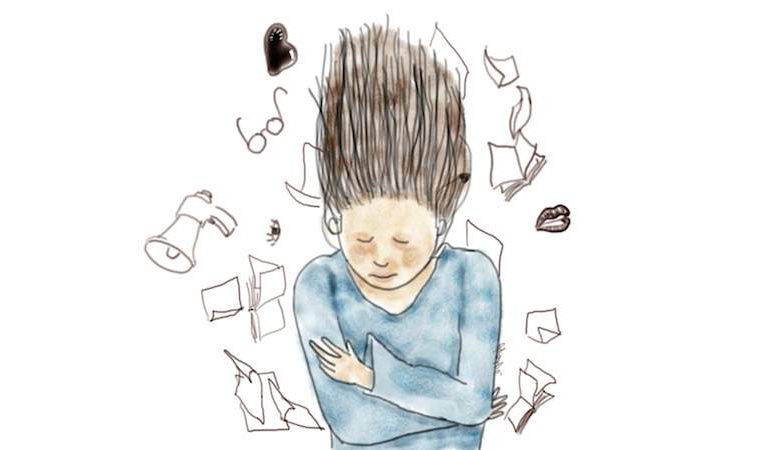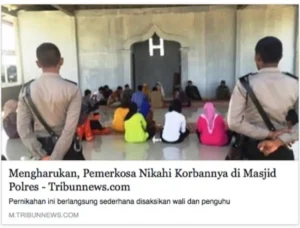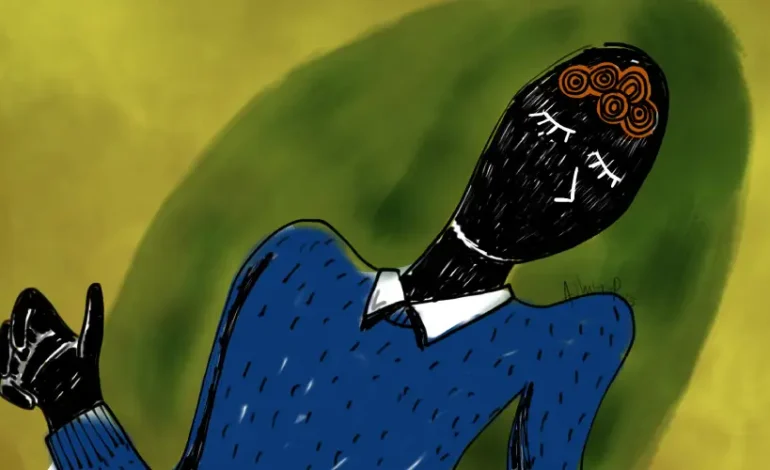State of Women: The Rape of Indonesian Children

Since the dawn of news as commodity, there’s probably never been a day without bad news. But here in this part of the world, sometimes the media make the bad news even harder to take.
Take this report last week about the wedding of a 21-year old rapist named Dedi to his 15-year old victim at the local police office, where the former was being jailed as the legal case against him is being built.
I don’t know about you, but seeing those three words put together in one sentence and in this order – wedding, rapist, victim (and practically a child at that) – just enraged me.
And what made it even worse was how the headline read on Tribunnews.com, where I saw the report first:
 Which translates as: “Touching, rapist marries his victim at local police’s mosque.”
Which translates as: “Touching, rapist marries his victim at local police’s mosque.”
Like, really? Touching? Because the rapist had “repented” and decided to “save” the girl – who, by the way, is pregnant with either his or his co-rapist’ baby – from the inglorious fate of having an un-fathered child?
Instead of being protected from her attacker, she was given away to be his wife, and that is the word they came up with to describe the mood of the story? It made me wonder if there was something missing in the conscience of the reporter who wrote the story and the editors who edited it.
When I checked again a few days later, Tribunnews had taken out the word “mengharukan” (touching) on the story’s headline, no doubt because of the many irate comments to the story.
But we can talk all day about the Indonesian media’s lack of sensitivity, nay, ignorance, when it comes to covering gender or child issues especially in relations to sexual abuse or violence. It baffles me that some print and online publications still insert an apology before mentioning the word “penis”, “breast” or “buttock”, but have no qualms about using sexist and judgmental language in their reports.
Their lack of awareness, however, reflects the way Indonesia treats its female citizens who have been victims of sexual violence.
Take that 15-year-old girl, for example. First of all, the legal marrying age for female in Indonesia is 16 – which is still too young by the world standard of 18 – but apparently the law gets broken all the time, even at the police’s own headquarters. Every year 500,000 Indonesian girls marry before they turn 18, keeping them in a cycle of poverty and abuse. Yes, girls who marry young are more vulnerable to physical and sexual abuse in domestic setting.
And the scary part is Dedi, her rapist husband whom she met through phone text messages, is a repeat sex offender who reportedly had raped and impregnated two underage girls before. Obviously neither of his previous victims felt safe enough to report him.
The report says he assaulted the girl for three days, before being replaced by another guy named Rianto (20). The two guys are now under arrest, facing charges of 5 to 15 years imprisonment with Rp 4 billion fines.
Marrying the girl might work to strengthen his defense that the sex was consensual, which, unfortunately, was also the line quoted by the police chief investigator. The police also said the wedding was held to make sure that the legal process would go smoothly.
King of Rape?
It was a bad week for young girls who have been victims of sexual abuse. Last week police discontinued an investigation into the Sultan of Solo, Pakubuwono XIII, on allegations of child trafficking and sexual abuse.
The local police said they found nothing to substantiate the accusation that the Sultan of the reputedly conflict-torn royal family in the Central Java city had raped a 16-year girl and fathered her child, because no witnesses gave sufficient testimony.
The victim, a 10th grader in a vocational school, claims she was promised a job working for the king by a woman, who sold her to him instead for Rp 2 million (US$154). The student also claims she lost consciousness in a car after eating a candy given to her by him. She woke up naked in a hotel room with the Sultan, who then gave her some money. She only reported the attack four months later in July 2014, and by then the police said they could not substantiate her accusations.
In November the girl gave birth to a son and asked that the Sultan, who only has a symbolic cultural role without any executive power, underwent a paternity test. But he has refused to give his DNA sample, and the police had done nothing to force him.
The Pious Rapist
Meanwhile, in Malang, East Java, police last week arrested the principal of an Islamic Junior High School for allegedly molesting two of his students, both age 14 years old, during a scout camping trip.
The victims reportedly fell ill during a bonfire and were brought by some teachers to the principal’s car. Instead of taking care of the pair, the principal molested them. Reports said they were still suffering from psychological traumas after the assault.
The principle has denied the charges claiming he was only helping the two girls, who were being “possessed” – by the devil, I assume.
This is the latest in a long list of teachers and principals sexually assaulting and harassing their students including those in Islamic schools. In East Java a cleric at an Islamic boarding school was accused last year of raping 11 pupils age 15 to 17. A few more Islamic clerics have also been arrested for sexually assaulting their underage students.
All of these should at least remind you of the constant threats that women and girls face in societies in which sexual predators not only walk free, or get off with light punishment, they are also emboldened by a patriarchal society that often turns a blind eye to sexual violence, or consider it part of the norm, as reflected in the way the law is hardly enforced.
“Why do men rape?” asks Israeli film maker Leslee Udwin in an interview, “ I discovered that the disease is a lack of respect for gender. It’s not just about a few rotten apples, it’s the barrel itself that is rotten.”
Need further proof? Watch the trailer of her latest documentary India’s Daughter, which will be aired on BBC4 on International Women’s Day on March 8.
*Read Devi’s own experience as a child sexual abuse survivor and follow @dasmaran on Twitter.
To continue the conversation and support the campaign against sexual violence, visit campaign.com/mulaibicara.






















